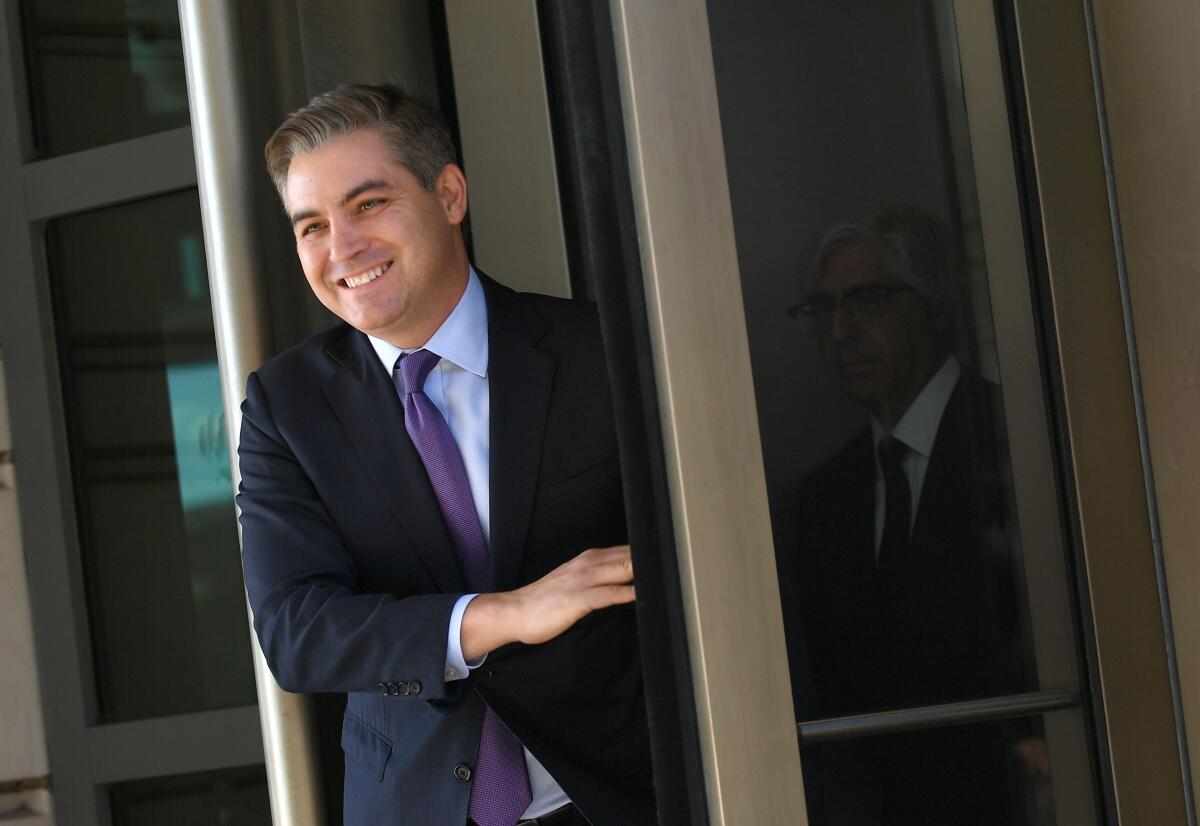Jim Acosta is tough on Trump. Will CNN move him to the graveyard shift?

- Share via
Fans of Jim Acosta may soon have to wait until the midnight hour to see their favorite CNN anchor — or perhaps not see him at all.
Acosta, a fixture on the Warner Bros. Discovery-owned network since 2007, is mulling a proposal from CNN Chairman and Chief Executive Mark Thompson to give up his daytime shift and move to Los Angeles to helm a two-hour nightly newscast that starts at midnight Eastern time.
A CNN representative and Acosta declined to comment.
But two people familiar with the discussions confirmed the talks, which were first reported last week in Status, the newsletter written by former CNN media correspondent Oliver Darcy.
Acosta has yet to make a decision on accepting the assignment, said the people familiar with the matter, who were not authorized to comment publicly. He has been told by CNN that the move to Los Angeles is not a requirement and that the new program could come out of Washington, where he lives with his family.
If CNN goes forward with the move, some will see it as a way of capitulating to President Trump by reducing the profile of a journalist known for his aggressive coverage of Trump’s first administration. If Acosta decides against taking the assignment, he may exit the network, according to people familiar with his thinking.
A number of media, entertainment and tech organizations, including the Washington Post, the Los Angeles Times, Amazon and Facebook parent Meta, have been accused of looking for ways to avoid getting on the bad side of Trump, who has shown a willingness to retaliate against his critics.
There has been an ongoing effort by CNN to lure back conservative and Republican voters since the network became part of the David Zaslav-run Warner Bros. Discovery in 2022.
Acosta became a major antagonist of Trump during his tenure as White House correspondent. The White House suspended his press credentials in November 2018 after a testy exchange with Trump at a news conference. At one point, Acosta refused to relinquish the microphone to an aide who tried to retrieve it from him.
CNN correspondent Alex Marquardt defended his story on Zachary Young, a security consultant who charged $14,000 or more to evacuate people from Afghanistan.
During the suspension, Acosta received wide support from the rest of the press corps, including Fox News, which is frequently harsh in its assessments of CNN and defensive of Trump. A federal court judge ordered his credentials reinstated.
Acosta remains a tenacious skeptic and fact-checker of Trump during his “CNN Newsroom” hour. He has not let up since management gave him the proposal about his future role.
On Wednesday, Acosta doggedly pressed Rep. Tim Burchett, R-Tenn., over Trump’s decision to pardon or commute the prison sentences of the Jan. 6 rioters, including those who committed violent acts against police officers.
One reason CNN wants Acosta to make the move is to accommodate longtime anchor Wolf Blitzer, who is expected to leave his late-afternoon program, “The Situation Room,” and take over Acosta’s current shift at 10 a.m. Eastern.
Thompson is pushing the plan as a way to give viewers on the West Coast a live prime-time newscast. Acosta’s program would also air on CNN International, putting him on in the morning in Europe.
CNN, Fox News and MSNBC all currently air repeats after 11 p.m. Eastern.
But there is a reason why networks don’t invest in live programming near and after midnight. About 80% of the U.S. audience lives in the Eastern and Central time zones. Once the clock strikes 12, much of the TV audience is asleep, especially older viewers who make up the bulk of the news audience.
While social media can spread video clips of interviews no matter what time they air, live news programs have a greater impact during the day when they become part of the national conversation. A CNN program airing at midnight would also face the challenge of booking live guests.
More to Read
Inside the business of entertainment
The Wide Shot brings you news, analysis and insights on everything from streaming wars to production — and what it all means for the future.
You may occasionally receive promotional content from the Los Angeles Times.












